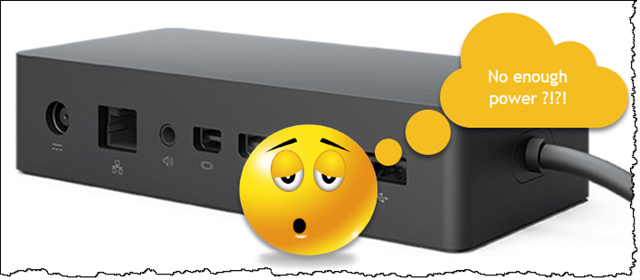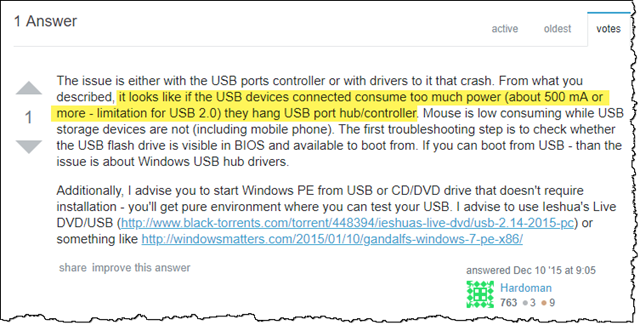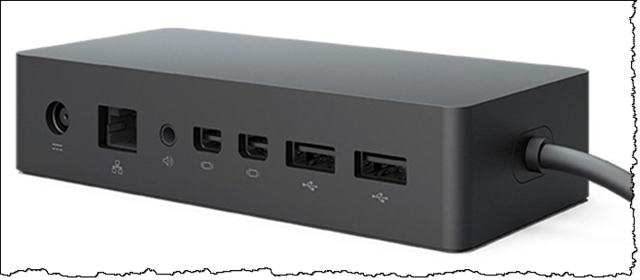Ahhh, of course I should know that "An unspecified error occurred (696e647863686b2e 9cb)" actually means "hey, your USB disk is drawing too much power from the USB-port"!
- Suspect your USB connections – allways!!
- Expect to spend hours on the forums looking for symptoms, hints and stuff to try out!
- DON’T EVER THINK about getting the Microsoft Surface Dock … piece of heavy junk!
Disk operations onto the BitLocker-drive reports tons of errors1!
Isn’t it great when Windows (and most other software too ![]() ) gives you completely other symptoms to problems?
) gives you completely other symptoms to problems?
In my previous post I tried to get BitLocker to play nicely on my machine. Huge problems with drop-outs, perhaps not even the fault of BitLocker itself, but it turned out that I couldn’t even connect the disk anymore without Windows going completely haywire! Lot’s of messages in the event log like;
“Reset to device, \Device\RaidPort3, was issued”
"The IO operation at logical block address xxx was retried"
"A timeout (30000 millisec) was reached while waiting for a transaction response from the WSearch service"
Trying to salvage the drive – and as a result of reading loads of forum-posts on the net, I saw that I could try to use the old CHKDSK again. Run in as an Administrator with the parameters /F /R and /X (well, F should be automatically implied by R). The most important parameter is the X, which tells CHKDSK to unmount the drive for processing. The first run yesterday evening ran for a full 6-7 hours, and when I returned to the computer this morning, I couldn’t get in touch with Windows at all. Something was stalling the machine 100%!
Disconnecting the USB drive docking and Windows came up (pheew!) without problems. Connect the USB drives again, and boom – everything was stuck.
After many attempts I finally was able to issue the CHKDSK command. It ran for a while, and boink – “An unspecified error occurred”?!?!

Whaaaat! Could unbelievably be lack of USB power?!?!
Again, out looking at the net for answers! I found a hint to the root-cause of the drop-outs in this page. One of the answers hinted that the power-drain of the USB equipment might be the cause;
My main machine is Microsoft Surface Book 2 with the Microsoft Surface Dock. The dock looks like this;
Yupp, my USB Docking station (remember, the ICY BOX 2bay HDD station) was connected to this docking station. Connecting it directly to the laptop, and away went all problems with stuck Windows as soon as I connected the USB drive! I could run the CHKDSK without unspecified errors!
This is just so unbelievable! The Surface Dock above is one of the more expensive port-replicators I have ever owned. Approx $230 in Norway for this solid block. Yes, there isn’t anything wrong with the build-quality. I don’t know what causes the weight, but it definitely can’t be the power supply! It turns out that the ports on the dock, don’t supply enough power to heavier USB equipment. What!!! That is the first port replicator where the USB ports has been just like a $2 USB hub from eBay!! Since I am ranting on this piece of shit, I can also report about a couple of other “features” of this dock;
- Have you plugged your iPhone charger cable into the dock? Don’t expect that to work when you power up the machine first thing in the morning! No, you have to manually reinsert the USB cable into the dock to “enable” it again. Forget this – and you might end up with a flat iPhone-battery because you though you were charging it?! Haha, bummer!
- Using Display Port for your external monitor? Haha, you have to reinsert that too almost every time you connect to the dock! It turns out that it only support a VERY small number of monitors and resolutions.
Start reading about the dock on the net, and you’ll find loads of similar experiences. The correct price-range for this dock is approximately $10 ….
What about the content of the BitLocker-drive?
What would you guess? OF COURSE it was corrupted! And there ends my tour with BitLocker. Yes, the main drive on the computer is still BitLocker-controlled, as this is the company policy. But for other uses – good bye!
But – I still want to protect my USB drive, so now what? In the previous article I mentioned that VeraCrypt and StorageCrypt could be alternatives. I went for a commercial alternative – BestCrypt from Jetico.
Of course I don’t quite know yet, whether that is better or not. One little similarity to BitLocker, was the estimated time to encrypt whole 4 TB …

Haha, somethings never change I guess. Encryption does take time. But remember – after 72 hours, BitLocker were only halfway through. I guess BestCrypt perhaps is somewhat faster. I’ll be back with a report on BestCrypt by the way.
PS: I opted to encrypt only used space with BestCrypt Volume Encryption, and that was much faster ![]()



